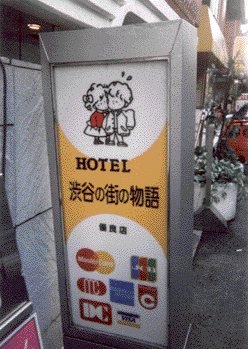|
Love Hotel Diaries, blank books left in the rooms of many hotels, allow guests to document their rendezvous the old fashioned way. Scrawled with amorous confessions, or boasts about sexual prowess, these journals give owners plenty of insight into their customers' more outlandish fantasies. Several sites offer places to enter commentary, and one of them, http://www.knights.ne.jp/hotel/search/lower.html, provides a Love Hotel search engine (in Japanese) where you can check off the location and choice of comforts. But, to be fair, not everyone who enters a Love Hotel engages in cuckoldry. Many customers are married couples, merely out for the conjugal privacy they can't experience at home. In big cities like Tokyo and Osaka, high rents and impacted space make living inadequate for young families. An ordinary sleeping arrangement for many parents with young children is called "Kawanoji" for its resemblance to the kanji character for river. Usually the mother and father sleep on the same futon, with the child in the middle. Needless to say, this situation dims the spark of wedded bliss.
For the most part, the Japanese are sexual pragmatists. Condom machines sit innocuously on public street corners, and soap lands (Turkish baths) and sex clubs stand smack in the middle of residential areas. On the trains, salarymen, Japan's army of gray lapelled workers, read manga with adult content in full view of the passing public. As a friend of mine once remarked, "The idea that public and private are separate hasn't really taken hold in Japan." With Love Hotels, entrepreneurs studiously maintain at least the illusion of privacy. No matter how gaudy the exterior, the entrance is usually very small and discreet, enabling patrons to slip in casually. Upon entering the ostensibly deserted lobby, customers can feel both relieved by the indifference and unnerved by the solitude. Love Hotels get rid of intrusive staff and replace them with the do-it-yourself ease of a vending machine. Guests choose their accommodations from a wall panel with ten to twenty backlit photographs of available rooms. Each picture has a description of the chamber's amenities along with the prices for rest sessions and overnight stays. Only upon pressing a button for a room, will another human presence enter the picture. Payment is made at a window where the faces of both customer and clerk are carefully obscured by tinted glass, or a blind, pulled so that only the money exchange remains visible. At some hotels, visitors have the option to pay upon check out, but despite the anonymity, the temptation to dock and dash remains in check. According to a well-circulated urban legend, each room is outfitted with a hidden video camera that can easily turn dishonest customers into part of the hotel's entertainment selection. Strangely, with all of the loving in the air and in the cash registers, Japan's waning population remains a major government concern. A birthrate of 0.4 percent, well below the number to replace the current population, worries economists and government statisticians. Last year the government allotted two hundred billion yen (two billion U.S. Dollars) to build more day care centers and provide an allowance for couples with young children. However, until work hours sink to reasonable levels, and the culture respects women as equals, it will take more than sanctioned romps in Love Hotels to bring up the numbers. As for now, trashy fiction writers and anxious lovers alike can revel in the lascivious opportunities afforded them at Love Hotels. |
